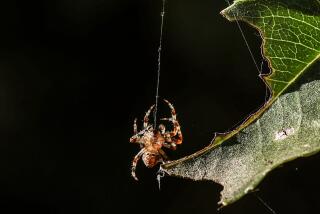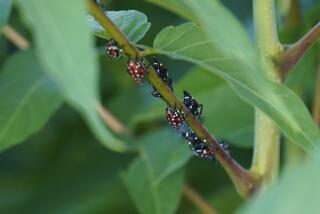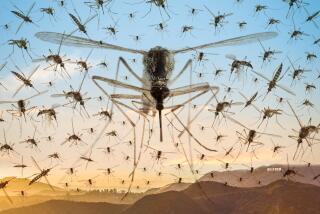Honey, we have company
- Share via
Adding insult to this summer’s weather injury, Argentine ants have begun marching into Southland kitchens almost two months ahead of schedule. And they’re not alone in making their seasonal debut early. Wasps, fleas and spiders seeking refuge from the recent record-shattering heat also are invading humans’ living spaces.
These unwelcome visitors won’t be pulling up stakes any time soon, according to scientists.
“They’re here now because of the hot weather,” said Deborah M. Gordon, professor of biological sciences at Stanford University. “They’ll leave when it gets cool.”
They might leave the kitchen during brief respites from the heat but will seek refuge there again, probably through October.
Meanwhile, they’re hard to vanquish. No matter how vigilant a homeowner is about cleanliness, ants still find a way indoors and stay there until the weather cools, experts say.
Spraying poison to get rid of Argentine ants is senseless, Gordon said. “You’ll kill a few workers and poison yourself. But no matter how much you spray, more ants will always be produced.”
That’s because multiple queens produce thousands of workers throughout a network of nests, often all in one backyard -- under steppingstones, at the base of trees and in woodpiles. Sometimes a dozen nests are scattered around one property, including inside walls.
Boric-acid baits provide temporary relief from indoor ants. The baits are the least toxic to humans but will not kill the queens. The substance, and all baits, should be kept away from children and pets and applied according to the directions. Gordon also suggests using solutions with strong odors to eliminate ant trails -- which other ants follow -- such as orange peels, clove oil and window cleaners. Ultimately, however, ants will find other trails later.
Outdoor baits in containers, such as those with arsenic, prompt ants to take the poison to their nests, which in turn thins the pests’ ranks while not poisoning the environment, said Mary Louise Flint, a UC Davis entomologist. The poison has to reach all the queens to be completely effective.
Ants love dog and cat food, so to discourage the insects from coming indoors, place a pet’s food bowl inside a larger bowl containing water. The ants will not cross the “moat.” They like protein- and sugar-based foods, so tightly seal cereal, snacks and soda. Also, caulking cracks around the foundation of the house and at entrance holes for water pipes, telephone lines and cable TV wires typically keeps ants out, for a while.
Wasps, summer’s other hot-weather pests, also are showing up in greater numbers than usual, said Todd Veden, a Terminix specialist in Chatsworth. Although good for ridding a garden of unwanted insects, they do spark fear in humans. The colonies -- which have multiple queens -- survive one year and die when cold weather rolls around, except for the queens, which survive to start another colony the next summer.
Homeowners who don’t want so-called paper wasps hanging around -- they build umbrella-style nests under eaves -- should not try to eradicate them on their own. When disturbed, wasps signal their cronies to attack. Better leave the job to the pros.
Fleas, which love hot weather and live indoors and out, also are best eliminated by the experts. Before the technician arrives, homeowners must vacuum rugs, pet beds and furniture thoroughly. Wash bed ruffles and other linens to be put back on after the process. Fido will need to be flea-dipped before rejoining the household. At least one repeat visit by the pest-control company usually is necessary, Veden said.
Garden-variety spiders can be removed from the great indoors by using a shop vacuum, the boxy-type appliance with a hose attachment. Experts caution homeowners to use care when removing the vacuum bag for disposal because the arachnids can escape.
Black widows, which covet dark, cool spaces such as garages and outdoor woodpiles, are another matter. The females are venomous and their poison packs a wallop. When working in their habitat, wear long sleeves and heavy gloves.
“If dealing with black widows ... call a professional,” Veden recommended.
For more information about pest identification and control, log on to UC Davis’ Integrated Pest Management website at www.ipm.ucdavis.edu.
More to Read
Sign up for The Wild
We’ll help you find the best places to hike, bike and run, as well as the perfect silent spots for meditation and yoga.
You may occasionally receive promotional content from the Los Angeles Times.






